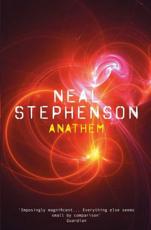It's been a while since the last review, my apologies. The two main reasons are that work has been a tad busy, compounded by the fact that I've been wading through Neal Stephenson's 928 page Anathem.
This is fiction we're talking about. It's somewhere on the boundary between hard sci-fi and speculative fiction if you want to try to pigeonhole it, but the ideas it's playing around with are even more borderline, dancing between mathematics, physics, metaphysics and philosophy.
Science fiction can sometimes be a little lacking in the more traditional elements of literature, like character development and plot, instead relying on the ideas involved to carry the story forward. Clarke's 2001 and Crichton's Andromeda Strain are good examples, and there's nothing wrong with it if the ideas are good enough. Anathem, on the other hand, meshes some very big ideas with an elegant and intricate story set in a detailed, imaginative parallel universe. It's witty, it's smart, it even has its own soundtrack online.
Fraa Erasmus is one of the Avout, a monk class set aside from the rest of the world. He's a Decenarian in the Concent of Saunt Edhar. Yup, there's a lot of new language to get to grips with, helped along with regular excerpts from "The Dictionary" and a glossary at the back. It's tricky at first, with a lot of flicking back and forth, but does add to the whole feel of the novel.
The big difference between our world and Erasmus' is that his monk class are, generally, atheistic. The Avout are mathematicians, philosophers and theoretical physicists. Their only possessions are their bolts, cords and spheres (a reference to the basics of geometry) and their only media chalk, ink and stone. From these basics, and some hard thinking, they probe the nature of the reality around them. Yes, it's easier with computers and particle accelerators, but that was tried and, shall we say, went badly. They do, however, have telescopes, and one day somebody spots something which would ruin the plot if I continued...
So that's all I'll say on the storyline, and on to the ideas...
Ideally, you'll be aware of the basics of the history and philosophy of science before you pick this book up, because it's packed with direct and more subtle references from Plato to Einstein. The main science theme is Platonism, the nature and existence (or otherwise) of mathematical objects. For example, Pythagoras' Theorem was true before any human discovered it...so does the mathematically perfect right angled triangle actually exist, and if so where?
Tegmark's many-levels-of-multiverse is covered, as are orbital mechanics, fluid dynamics (in zero g no less), and the frankly confusing final few chapters read a little more smoothly if you consider them in the light of quantum suicide and quantum immortality thought experiments. I'm kind of disappointed that I've finished it, but this is the kind of book that will leave you reaching for many, many others just so you can go back to it with a greater understanding.
ISBN: 9781843549178
Atlantic Books

